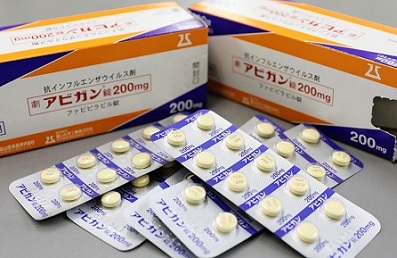COVID-19 Drugs: Latest Japanese Study Shows Association Between High Serum Favipiravir Concentrations And Drug-Induced Liver Injury!
Source: COVID-19 Drugs May 06, 2021 3 years, 10 months, 3 weeks, 3 days, 17 hours, 14 minutes ago
COVID-19 Drugs: A new research by researchers from Japan shows that the teratogenic drug: Favipiravir that certain ignorant countries are using to treat COVID-19 can also induced liver injury if the serum concentration of the drug exceeds a certain threshold!

The study findings were published on a preprint server and are currently being peer reviewed by teams from the United States and also Europe.
https://www.medrxiv.org/content/10.1101/2021.05.03.21256437v1
Favipiravir was considered to be none effective to treat COVID-19 according to the US FDA clinical trials.
https://www.thailandmedical.news/news/breaking-covid-19-drugs-us-fda-drug-trial-concludes-that-most-drugs-being-used-including-favipiravir,-lopinavir,-ritonavir,-chloroquine-has-no-effects
The drug is also not used in countries in Europe, America, Canada, Australia and Singapore.
https://www.thailandmedical.news/news/covid-19-guidelines-canadian-medical-association-issues-new-treatment-protocols-that-omit-use-of-favipiravir,-lopinavir-ritonavir,-hydroxychloroquine-
https://www.thailandmedical.news/news/covid-19-drugs-favipiravir-avigan-fails-to-achieve-statistical-significance-in-fujifilm-trial,-effectiveness-questionable
https://www.thailandmedical.news/news/favipiravir-studies-involving-animal-models-shows-favipiravir-has-very-weak-effect-on-sars-cov-2-and-not-viable-as-an-effective-therapeutic
The study team from University of Toyama and Nihon University aimed to evaluate the incidence and pattern of favipiravir-induced liver injury and the potential association between serum concentrations in hospitalized COVID-19 patients.
The reseachers retrospectively reviewed laboratory-confirmed patients with COVID-19 for whom serum favipiravir trough concentration (Cmin) was measured under steady-state conditions during treatment. All patients were administered 1800 mg of favipiravir twice daily on the first day and 800 mg twice daily from the second day.
Thirty observed favipiravir concentrations were collected from nine patients. Of these, favipiravir-induced liver injury developed in three patients after 13 (11–14) days from the initiation of therapy, with two classified as cholestatic and one hepatocellular injury, with a score of four (possible), seven (probable), and three (possible) based on the CIMOS/RUCAM scoring syst
em. Median (range) favipiravir Cmin at steady state was found to be significantly higher in patients with liver injury at 66.4 (47.8–72.4) mg/L than in those without injury at 12.8 (9.4–21.8) mg/L (P = 0.028).
The study showed that higher favipiravir serum concentrations were observed in patients who developed favipiravir-induced liver injury than in those who did not. As the variations in favipiravir concentrations between patients were large, personalized optimal dosing strategies may be needed for safe use.
The favipiravir tablets (Avigan) come in standard tablets of 200 mg each and in some countries, ignorant authorities are making patients, regardless of disease severity, to take 5 tablets in a 24 hour period!
The drug is also teratogenic ie it may cause birth defects via a toxic effect on an embryo or fetus and in some cases also have long terms mutagenic effects.
For more on
COVID-19 Drugs, keep on logging to Thailand Medical News.
